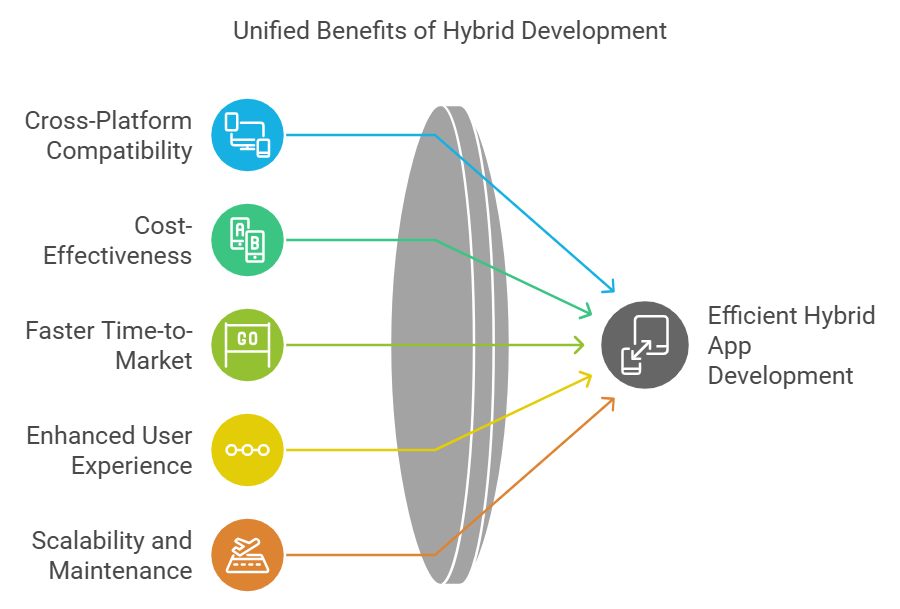
5 Reasons to Choose Hybrid Mobile App Development for Business Agility
- by mayank.thapa
As the world progresses towards becoming a digital-centered environment, companies require solutions that are easily scalable in order to perform to market requirements. A hybrid type of mobile development has become fashionable for those organizations that want to intertwine flexibility, cost, and performance. Utilizing the features of native and web applications hybrid applications help companies in today’s world where one Business Drivers Are rapid growth and innovation.
This article discusses five persuasive arguments why hybrid mobile app development is a perfect way of getting business flexibility, key advantages, and use cases.
What Is Hybrid Mobile App Development?
This process of developing apps that contain web technologies such as HTML, CSS, and JavaScript mixed with the native app framework. They are usually built in as native shells, enabling the application support across different operating systems such as Android or even iOS.
As distinct from non-cloud pure native applications, hybrid application mobile solutions are based on one single code which essentially saves time and money.

1. Cross-Platform Compatibility
Unified Codebase for Multiple Platforms
Perhaps one of the biggest benefits of using hybrid mobile app development approaches is the possibility of achieving cross-platform app development using a large number of codes. It helps free up time and resources to build and maintain two applications for Android and iOS.
For instance, organizations may use tools such as React Native or Flutter to create seamless customer experiences without resulting in the creation of subpar duplicative work.
Key Benefits:
- Faster development cycles.
- Another is easier to maintain and get updated.
- Access to a broader audience.
2. Cost-Effectiveness
Budget-Friendly Development
It can be costly to code a different app for Android and iOS since designing and coding them from scratch requires a lot of resources, for companies that are small or medium. When it comes to hybrid mobile app development costs can be a lot lower than when using a dedicated code.
Also, frameworks for hybrid application mobile development like Ionic or Xamarin contain strong tools and libraries for improving the velocity of application advancement and decreasing costs.
Key Benefits:
- Lower upfront investment.
- Lower maintenance costs that may be incurred frequently.
- Cost-effective scalability.
3. Faster Time-to-Market
Speedy Development Cycles
Time is another resource that must however not be overlooked because in today’s world, doing business means working within set timelines. Hybrid mobile apps can also help businesses release their products into the market quickly, thus outcompeting other firms.
There is a great advantage that developers can save a lot of time on coding and testing by using templates of frameworks and tools. In addition, one app update can be released at once; both for the users with Android and iOS devices, making it efficient.
Key Benefits:
- Quick deployment.
- Markets are updated on more than just apps, this has revolutionized how updates occur on different platforms at once.
- Quick feedback and iteration.
4. Enhanced User Experience (UX)
Consistency Across Platforms
One major aspect that typically concerns business endeavors in aspects that are related to successful business execution for the purpose of meeting consumer demand is the manner of continuity of user experience across devices. Hybrid mobile app development is quite successful in providing similar UX because the appearance and execution are upheld to be similar to cross-platform initiatives.
Also, It is very important to note that hybrid mobile app frameworks allow the ability to use native features such as push notifications and GPS among others in making the usage experience better.
Key Benefits:
- Uniform design and experience.
- Access to native device features.
- Reduced learning curve for users.
5. Scalability and Maintenance
Basic Updates and Elaborate Scalability
With growth comes change, and new needs that need to be addressed by business applications. Compared with the native development paradigm, it is much easier to scale up or add new features because the codes are shared across platforms.
Also, the concept of maintenance is much easier to execute as patching can be made in one go while putting it into application in every available platform.
Key Benefits:
- Easy scaling to accommodate growth in an organization.
- Bug fixes and updates were made simpler.
- Long-term sustainability.
Key Frameworks for Hybrid Mobile App Development
Several frameworks enable enterprises to harness hybrid application mobile solutions successfully. Some of the most popular ones include:
- React Native: Famous for achieving virtually real-time results of the original.
- Flutter: It provides an elegant and versatile Graphic User Interface.
- Ionic: A UI library is also offered containing sets of ready-to-use UI elements.
- Xamarin: Supplies integration with native APIs at a more profound level.
These frameworks have therefore helped organizations to achieve the flexibility of operation without necessarily affecting quality.
When to Choose Hybrid Mobile App Development
Hybrid mobile app development is ideal for:
- Startups and SMEs: Efficient handling of overall costs and fast implementation.
- Cross-Platform Needs: Addressing multiple audiences on both Android and iOS.
- Time-Sensitive Projects: Such companies rush to market to capture the trends.
- Apps with Moderate Complexity: Use cases that do not involve a lot of native mobile application code.
Conclusion
A hybrid mobile app development approach has benefited businesses in the mobile solutions realm by being cheaper to implement, quicker, and can be scaled. The strategy is most suitable in organizations that intend to adopt a strategic and short-term orientation within a volatile market. That is why when using such structures as React Native or Flutter, companies can create only the best applications that will improve usage and make it better for users but do not demand high amounts of money and remain rather flexible.
So if you want to move to the next level of building a hybrid mobile app, Value Innovation Labs is on hand. With experience in modern technologies, we deliver bespoke professional solutions for your organizational objectives. Please give us a call for your inquiry today or log in to valueinnovationlabs.com.
Frequently Asked Questions
- What does a hybrid mobile application mean?
Answer- Cross-platform mobile app development involves developing an application on one platform but can run through different platforms as it is contained in a native shell.
- How does a hybrid mobile app differ from a native app?
Answer- Hybrid mobile apps operate on multiple platforms where the program is created with similar coding language and structures as the other platform, while native uses different programming languages to develop an application on the other platform.
- How does the hybrid approach make the development cost-effective?
Answer- It removed the necessity to create and support distinctive apps for Android and iOS, which will save money over time.
- Can the hybrid app work with the native level of the device?
Answer- Of course, using frameworks like Ionic and React Native, indeed, hybrid applications are able to navigate through GPS, camera, and so on, push notifications.
- For which kind of businesses are hybrid apps most advantageous?
Answer- Companies that involve startups, SMEs, and some enterprises that necessitate an immediate deployment of the app and support across multiple platforms will benefit from hybrid app development.
As the world progresses towards becoming a digital-centered environment, companies require solutions that are easily scalable in order to perform…
